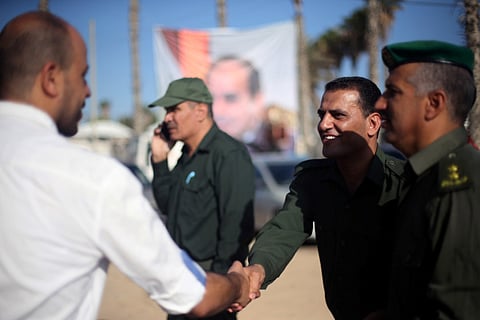Hamas hands over border crossings to Palestinian Authority
It was first key implementation of a landmark Palestinian reconciliation accord reached last month

Rafah: Hamas handed over control of the Gaza Strip’s borders with Egypt and Israel to the Palestinian Authority on Wednesday in the first key test of a landmark Palestinian reconciliation accord reached last month.
Nazmi Muhanna, the Palestinian Authority’s top official for border crossings, formally received control of the Rafah crossing with Egypt from his Hamas counterpart in a ceremony on Wednesday morning.
At a separate checkpoint with Israel, an AFP photographer saw Hamas installations being dismantled. Palestinian Authority and Hamas officials were also there overseeing the handover.
At the Rafah crossing, Palestinian and Egyptian flags were flying, with large pictures of Palestinian Authority president Mahmoud Abbas and Egyptian leader Abdul Fattah Al Sisi.
Mufeed Al Husayna, a Palestinian Authority minister, gave a short speech at the crossing, saying all the border crossings were being handed over.
“We began today, under the directive of the prime minister (Rami Hamdallah), to exercise our duties by receiving all the crossings,” he said, thanking the Egyptians for mediating the deal.
“There is no yellow and green. All our Palestinian people are under the Palestinian flag,” he added, referring to the flag colours of the political parties that signed last month’s reconciliation deal.
Hamdallah is due to visit Gaza again in the coming days, he added.
Hesham Adwan, director of information at the Hamas crossings authority, told AFP that Palestinian Authority employees would take full control of the borders.
Under the Egyptian-brokered deal, the Palestinian Authority is due to take full control of Gaza by December 1.
The checkpoints had been due to be handed over by Wednesday, and were seen as a first key test of the strength of the reconciliation agreement.
Hamas has ruled Gaza since 2007 when the Islamists seized control in a near civil war with Abbas’s Fatah, based in the occupied West Bank.
Israel has maintained a crippling blockade on Gaza for a decade and launched three brutal assaults on it since 2008.
Egypt has largely closed its border as well. The Rafah crossing was not open on Wednesday despite the official handover, though Hamas is hoping it will be in the coming days or weeks.
The Gaza Strip’s two million residents suffer from worsening humanitarian conditions, with only a few hours of power a day and a lack of clean water.
The reconciliation agreement has raised hopes that a more regular opening of the Egyptian border could ease humanitarian suffering.
Robert Piper, the United Nations’s top humanitarian official for the Palestinian territories, said he was travelling to Gaza on Wednesday to discuss humanitarian conditions.
A number of issues, including the future of Hamas’ vast military wing, remain uncertain in the reconciliation agreement.
Multiple previous pushes for reconciliation have collapsed.
On Monday, seven Palestinian militants were killed when Israel blew up a tunnel it said stretched from the Gaza Strip into its territory that was intended for attacks.
The incident raised fears the timetable could be delayed, but both the Palestinian Authority and Hamas stressed they were committed to the agreement.
Officials from both the Palestinian Authority and Hamas accused Israel of trying to disrupt the deal, though Israel’s army said it was forced to act after its sovereignty was breached.
All the major Palestinian factions are due to meet in Cairo later this month to discuss the formation of a unity government.
Israel has said it will reject any unity government that includes Hamas in which the Islamist movement does not disarm and recognise the Jewish state’s right to exist.
The Fatah-dominated Palestine Liberation Organisation has recognised Israel, but Hamas has not although it has watered down its charter to be less hardline.



